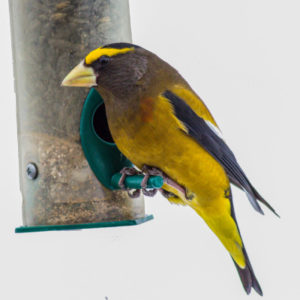 Sunday was National Random Acts of Kindness Day. Random acts of kindness can go a long way. But what if you were to show your random act of kindness to an individual who could never return the favor? Wildlife are the original settlers of this land, they were here long before humans and continue to thrive in the mountains. It is important we show kindness to our wildlife neighbors, not only because we, as humans, have moved into their habitat, but also because our lives and livelihoods are supported by healthy ecosystems and healthy wildlife. In order to keep our wildlife healthy, humans can do small random acts of kindness to show our love and appreciation for our native mountain wildlife.
Sunday was National Random Acts of Kindness Day. Random acts of kindness can go a long way. But what if you were to show your random act of kindness to an individual who could never return the favor? Wildlife are the original settlers of this land, they were here long before humans and continue to thrive in the mountains. It is important we show kindness to our wildlife neighbors, not only because we, as humans, have moved into their habitat, but also because our lives and livelihoods are supported by healthy ecosystems and healthy wildlife. In order to keep our wildlife healthy, humans can do small random acts of kindness to show our love and appreciation for our native mountain wildlife.
During these cold winter months, wildlife are struggling to survive. Many animals are relying on the scarce amounts of vegetation that are available until the spring brings new growth. One thing you can do in your own backyard is to set out bird feeders. It is safe to leave bird feeders out all winter long because black bears are hibernating and will not disturb the feeders. Many of the bird species that are still here include black-capped and mountain chickadees, scrub jays and stellar jays, nuthatches, and of course, the infamous magpie. Bird feeders help feed the birds during winter and can also provide great opportunities for wildlife watching.
It is hard to believe, but spring is right around the corner. A good spring gardening project to help wildlife is to incorporate some native plant species into your garden. A native species is a species that developed with the surrounding habitat and was not introduced by humans. We have many native species of plants that can help local pollinators and feed various wildlife species. Wildflowers that would make a good addition to your garden can include lupine, gentian, columbine and Indian paintbrush. These beautiful flowers are native and will not only add color to your landscape, but will also attract pollinators such as bees, hummingbirds, and hummingbird moths to you garden.
One last idea to show kindness to wildlife is to include a water feature on your property. All living things require water to survive, and water can be scarce in the high country. Providing a water source will encourage wildlife to come take a drink or bathe right outside your door. These water sources can be as simple as a bird bath or as large as an installed water feature. Additionally, water sources provide great habitat for aquatic macroinvertebrates. Macroinvertebrates are organisms without backbones, which are visible without the aid of a microscope. They live on, under, and around rocks and sediment on the bottoms of lakes, rivers, and streams. Although they are not super cute to look at, these species are important to take care, as they form the base of both aquatic and terrestrial food chains.
Wildlife are vital occupants of our mountain home. They are the original citizens of the area and keep the Rocky Mountains wild and free. It is important we as humans learn to live in peace with wildlife, and in particular, that we support healthy habits for the species that share our wildland home. Through random acts of kindness, we can connect to and support living things of all shapes and sizes and learn to better cohabite and cooperate with wildlife in this land we all call home.
Rachel Holland is the lead naturalist at Walking Mountains Science Center in Avon. When she is not working, she enjoys horseback riding and hanging out with her guinea pig, Finn.









